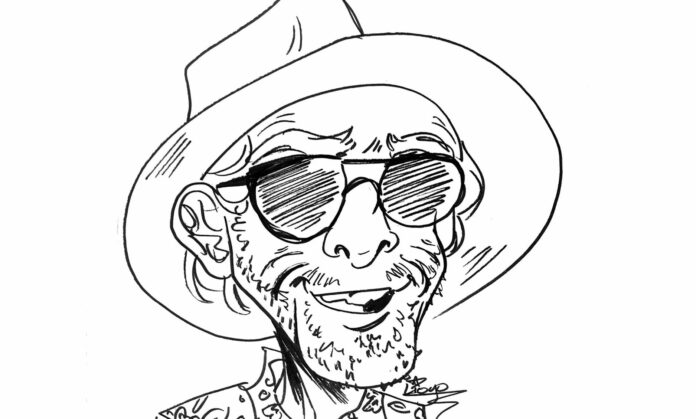It all started about three weeks ago with a stiffening of the neck that while a minor bother for a few days to within a few hours the pain became severe enough that I could not swivel my head side-to-side more than a few inches to either the right or left, and then I was unable to lift my arms enough to comb my hair or brush my teeth. Whatever the cause, by the afternoon of the last day of March my situation got to the point of unbearable, so I got up the gumption and slowly and painfully walked the three blocks to the Mee emergency room.
I was treated very well, and left with a prescription and a referral to the orthopedic surgeon. I made the appointment; we discussed my medical past and it was determined to let the prescription do its job and, in a follow-up appointment, make another evaluation. Cool.
For the next two weeks or so, all went well with far less pain and more mobility; and then in a two-day period the pain, now shifted from the neck to the right shoulder, got so bad I was unable to make it to Thursday Workday down at the Museum. By midday the following day, I was barely able to move in any position without some real pain, so I asked a friend to give me a ride to, you guessed it, Mee Emergency Room. This time the treatment included a CatScan with some sort of warm fluid injected into the bloodstream, which helps medical staff see more clearly any damage to bone structure. There were blood and urine samples taken and a pain killer (not the medical term, they prefer “relief” over killer) injected and in a few hours, I was sent home with a diagnosis of not a bone problem but an infection. (If curious, the medical term is Acute Pyelonephritis.)
Well, this was something new and I was given a host of prescriptions to combat this infection. Because I had been without proper sleep for days and was now under the influence of meds, I laid down and, given it was now Friday afternoon, slept through to the evening and missed any opportunity to get the prescriptions as my pharmacy is closed on weekends. That may have led to my undoing as around 10 o’clock that evening I hit a wall; neither sitting, prone or standing could be done without extreme pain. Now, I have been knocked around quite a bit over the years and have suffered the physical buffeting that entails, but I have never felt such severe pain for that long a period of time in my life. Because most of those people willing to get me to the ER, again, prefer not to drive at night, I called for an ambulance. I hated doing that but was, as the saying goes, at the end of my wits.
***
We cannot afford to lose Mee Memorial Healthcare System. We just cannot. I would expect about 80% of the staff that I dealt with during my time at Mee hope to never see me again. I am a terrible patient. I know now, knew at the time, that every question asked, no matter how repetitive, that every procedure, no matter how repetitive, and that every form filled out, no matter how repetitive, was all for my benefit. The problem is I don’t always convey gratitude for the care I’m receiving, at least until the pain is gone and my wits have returned some. To those I offended, and there were too many, I sincerely apologize. I hope there isn’t a next time, but if there is I’ll try to do better.
We are all aware of the attack on American institutions, of the gutting and chaos the present administration is up to and the elimination of funding for many programs have already taken place, with the threat of many more budgetary cuts to come. Here is some important information sent to me by Rena Salamacha, Mee Memorial Healthcare System’s chief executive officer:
- Medicaid is the lifeline of rural hospitals. At Mee Memorial, more than 70% of our patients rely on Medi-Cal (California’s Medicaid program). Any cut to this funding puts essential services — including emergency care, surgeries and primary care — at immediate risk.
- Pending federal and state budget decisions are threatening to reduce or restructure Medicaid. For rural hospitals, which already operate on razor-thin margins, this could be catastrophic.
- Unlike Urban hospitals, we do not have a large volume of privately insured patients to offset the cost of underfunded programs. Every dollar cut to Medicaid has a direct impact on staffing, programs, and the scope of services we can offer.
- Mee Memorial is more than a hospital. We are the primary healthcare provider for the entire South County region — including clinics, wellness outreach, specialty care and partnerships with schools and senior centers. Reduction in funding risk fragmenting this ecosystem of care.
- Service cuts in rural areas aren’t hypothetical. Across California, we are already seeing rural hospitals close their OB departments, reduce hours or shut down altogether. If Mee were to follow that path, patients would need to travel over an hour — or more — for emergency or specialty care. For many, that’s simply not an option.
My first visit to Mee’s ER was when I was 10 years old, fell victim to the monkey bars and fractured my left wrist. I have been there a few more times over the years, taken a few friends there. I am a Medi-Cal recipient and have had seven successful surgeries and countless procedures performed at Mee Memorial Healthcare System. Getting to any other facility in times of emergency or for some specialty services is out of the question for me; and I am not alone. If Mee and “we” are to survive, it is up to us to let our voices heard by those holding the purse strings on rural hospital funding.
Take care. Peace.













